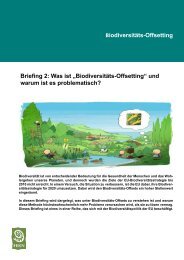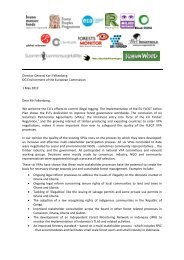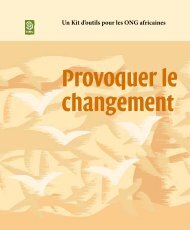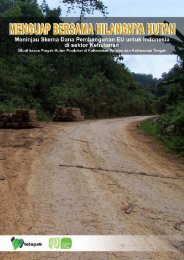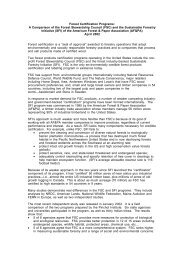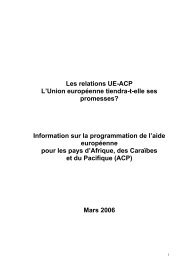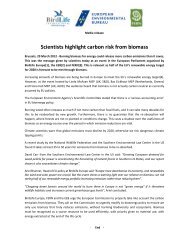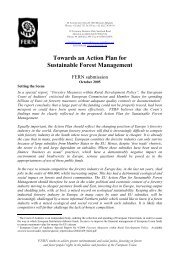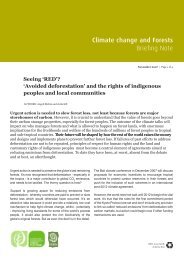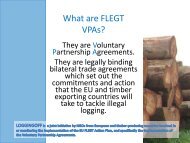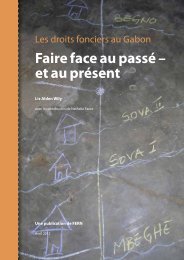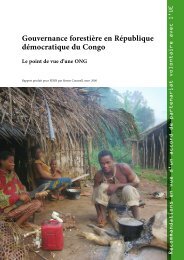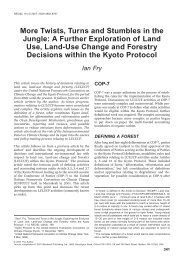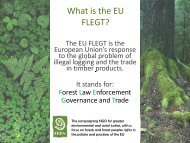Papua New Guinea - Fern
Papua New Guinea - Fern
Papua New Guinea - Fern
Create successful ePaper yourself
Turn your PDF publications into a flip-book with our unique Google optimized e-Paper software.
ecommends that government revise the National Forest Policy to fully recognize eco-forestry<br />
and small-scale and medium-scale logging. The report recommends a wide range of forest<br />
conservation measures aimed at upgrading the status of eco-forestry. It calls for the updating of<br />
logging maps to clearly show current and planned conservation areas, fragile forest types, areas<br />
of threatened or restricted plants and animal species and important water catchments not<br />
available for logging. Bank staff should read their report and support it.<br />
Immediate Recommendations to Ensure PNG’s Biodiversity Is Not Devastated in the Short-<br />
Term<br />
Industrial forestry is the greatest threat to PNG’s rainforest biodiversity. The boom is just<br />
peaking, and unless addressed immediately, PNG’s biodiversity will be significantly reduced<br />
over the next several years. Biodiversity in <strong>Papua</strong> <strong>New</strong> <strong>Guinea</strong> will not be protected in any<br />
meaningful way unless commercial logging is restricted quickly. Under such circumstances,<br />
local and international NGOs and individuals have been calling upon the PNG government and<br />
donor community to immediately pledge to:<br />
• Establish a timeline to permanently end industrial log exports from PNG, and a process to<br />
transition the industry to small and medium scaled community and certified forest<br />
management.<br />
• Establish a Commission of Inquiry with broad discretionary power to investigate all aspects<br />
of the current logging industry and make necessary recommendations, including possible<br />
criminal prosecutions.<br />
• The PNG government must develop and implement forest policy, legislation, regulations and<br />
guidelines to establish a timber industry based upon ecologically sustainable, small to<br />
medium scale, community-based eco-forestry management.<br />
• End donor subsidies to industrial log export. Redirect donor funds to transitioning the<br />
industry to sustainability and community based production and protection, cushioning the<br />
economic impact upon the government and landowners of doing so.<br />
The above must occur immediately if PNG’s rainforests are to avoid being fragmented with<br />
devastating impacts upon biodiversity, ecosystems and local well-being. In addition, the<br />
government and World Bank must make development of the National Biodiversity Strategy and<br />
Action Plan a top priority, and ensure that the strategy addresses the following:<br />
• Limits all logging in country to small and medium scaled, certified eco-forestry operations<br />
whose timbers are locally processed. Commercial scale logging will never be ecologically<br />
sustainable in PNG, and as noted above, needs to be immediately discontinued.<br />
• Identifies culturally appropriate manners within the clan based land tenure system to develop<br />
protected areas. This will require easy and accessible mechanisms for landowner clans to<br />
declare their lands protected areas. Such lands must be granted protected status that excludes<br />
commercial logging, and makes landowners eligible for trust fund financing.<br />
• Financial mechanisms must be implemented – building upon the existing Mama Graun trust<br />
fund – to provide incentives to keep most of PNG’s native rainforest intact as either clan<br />
based eco-forestry or protected areas.<br />
15



